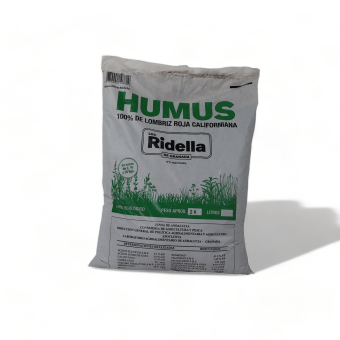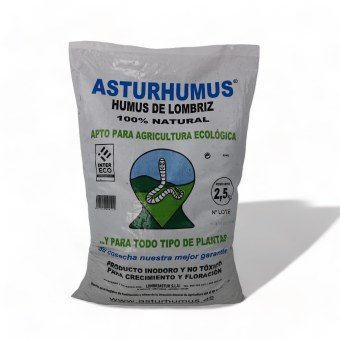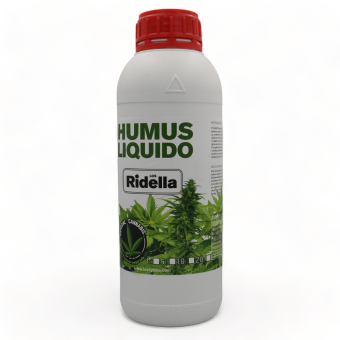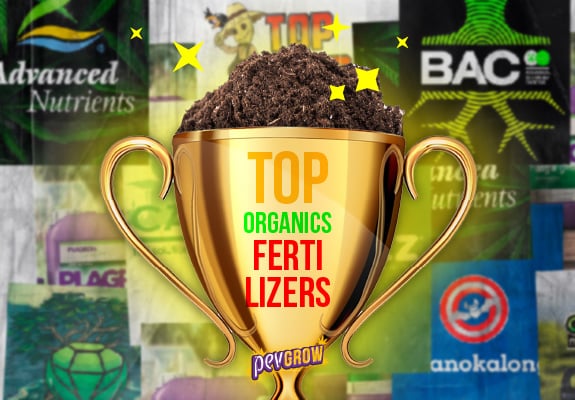- Worm humus is a valuable organic fertilizer for agriculture and gardening, improving soil fertility and promoting healthy plant growth. Learn more with this article from Pevgrow.
- Best Specific Fertilizers for Autoflowering Strains
- Fertilizers and Home Fertilizers for Marijuana


In constant struggle for the regulation of cannabis, mainly in the medicinal field.
18-06-2024 06:49:51 - Updated: 18 June, 2024
Worm humus, also known as vermicompost, is a type of organic fertilizer produced through the decomposition of organic matter by earthworms, specifically the species Eisenia fetida, commonly known as the red Californian worm. This product is highly valued in agriculture and gardening for its multiple benefits to the soil and plants. In this article, we will explore in detail what worm humus is, its properties, and how it can benefit your crops.
⛳ What is Worm Humus?
Worm humus is the result of the vermicomposting process, where earthworms consume organic residues, digest them, and excrete a nutrient-rich material. This decomposition process is faster and more efficient than traditional composting due to the constant action of the worms.
The final product is a dark material, with a texture similar to ground coffee, without an unpleasant odor, and full of essential nutrients for plants. This organic fertilizer not only provides nutrients directly available to plants but also improves soil structure and increases its capacity to retain water and air.
✨ What is Worm Humus Used For?
- Improves Soil Fertility: Worm humus is rich in essential nutrients such as nitrogen, phosphorus, potassium, calcium, magnesium, and micronutrients. These nutrients are released slowly, providing a constant supply for plants. Additionally, worm humus improves the soil’s ability to retain nutrients, reducing the need for chemical fertilizers.
- Increases Water Retention: The structure of worm humus improves the soil’s ability to retain water. This is especially beneficial in sandy soils that drain quickly and in compacted soils that tend to repel water. A soil that retains water better reduces the need for frequent watering and helps plants withstand periods of drought.
- Promotes Microbial Activity: Worm humus is full of beneficial microorganisms that continue to break down organic matter in the soil, releasing additional nutrients and improving soil structure. These microorganisms also help suppress soil diseases and promote a healthy environment for plant roots.
- Improves Soil Structure: The application of worm humus improves the physical structure of the soil, making it more friable and easier to work with. A soil with good structure allows better root growth, facilitates the drainage of excess water, and improves aeration, all important factors for the healthy development of plants.
- Reduces the Need for Chemical Fertilizers: Being a complete organic fertilizer, worm humus can reduce or even eliminate the need for mineral fertilizers. This is not only beneficial for the environment but can also result in long-term economic savings for farmers and gardeners.
🚀 Types of Worm Humus and Dosage: A Complete Guide
Worm humus is one of the most effective and versatile organic fertilizers available to gardeners and farmers. However, although solid worm humus is the most common and used, not all are the same. There are different types and forms of worm humus, each with its own characteristics and specific applications. Below you will see the different types of worm humus and we will provide recommendations on the appropriate dosages for their use.
 |
| Buy Worm Humus Los Ridella 2-20Kg |
|---|
Types of Worm Humus
- Pure Worm Humus: Pure worm humus is the final product of the vermicomposting process without any addition or further processing. It is rich in nutrients and beneficial microorganisms. This type of humus is ideal for soil amendments and compost mixes.
- Enriched Worm Humus: Enriched worm humus has been mixed with other organic ingredients to increase its nutritional content or to meet specific crop requirements. These may include bone meal, rock dust, or additional compost.
- Worm Humus Tea: Worm humus tea is a liquid extract made by soaking worm humus in water for 24-48 hours. This liquid worm humus is used as a foliar fertilizer or a nutritious irrigation that is quickly absorbed by plants.
- Worm Humus Pellets: Worm humus pellets are humus compressed into small granules. They are easy to handle and apply, ideal for compact soils or difficult to work with.
How to Use Worm Humus
Soil Amendment
Worm humus can be used as a soil amendment, incorporating it directly into the soil before planting. It is recommended to mix a layer of 2-3 cm of worm humus in the first 15-20 cm of soil.
Liquid Fertilizer
A “worm humus tea” can also be prepared by dissolving worm humus in water and letting it sit for 24-48 hours. This nutritious liquid can be used to water plants or as a foliar spray.
Top Dressing Fertilizer
Worm humus can be spread around the base of plants as a top dressing fertilizer as a mulch. This provides a slow and constant release of nutrients as the humus decomposes in the soil.
Potting Mix
When mixing worm humus with potting soil, it improves the quality of the substrate, providing essential nutrients and improving water retention capacity. It is recommended to mix 20-30% worm humus with potting soil.
Worm Humus Dosage
The amount of worm humus to use depends on the type of application and the specific needs of your plants or crops. Here we offer some general guidelines for different applications:
- Soil Amendment: Soil preparation: Mix 2-3 kg of worm humus per square meter of soil. Incorporate the humus into the first 15-20 cm of soil before planting.
- Garden Maintenance: Apply a layer of 1-2 cm of worm humus around the base of the plants every 3-4 months.
- Potting Mix: Substrate mix: Add 20-30% worm humus to the potting soil mix. For example, mix 2-3 parts of potting soil with 1 part worm humus.
- Worm Humus Tea: Tea preparation: Use 1 cup of worm humus for every 4 liters of water. Let the mixture sit for 24-48 hours, stirring occasionally. Strain the liquid and use the resulting tea to water or spray plants.
- Foliar Application: Spray plant leaves with worm humus tea every 2-4 weeks.
- Worm Humus Pellets: Lawn fertilization: Spread 50-100 grams of pellets per square meter of lawn. Water abundantly after application.
- Gardening: Incorporate 50-100 grams of pellets per plant when planting or as mulch around the base of established plants.
🎯 Environmental Benefits
The use of worm humus not only improves the health of your plants and the quality of the soil, but also has significant environmental benefits. By recycling organic waste and reducing the dependence on chemical fertilizers, vermicomposting contributes to sustainability and the reduction of the carbon footprint in agriculture and gardening.
👾 Conclusion
Worm humus is an invaluable resource for any gardener or farmer looking to improve the health of the soil and the productivity of their plants in a sustainable way. Its multiple benefits, from improving soil fertility to promoting microbial activity, make worm humus a superior option compared to chemical fertilizers. At Pevgrow, we offer high-quality products to help you make the most of this incredible organic fertilizer. If you are interested in these types of natural fertilizers, I recommend checking out this other article that showcases the best organic fertilizers for weed, you will surely like it. Transform your garden with the power of worm humus!
✅ FAQs about Worm Humus
Does worm humus burn plants?
No, worm humus does not burn plants. One of the main advantages of worm humus is its gentle and balanced nature. Unlike some chemical fertilizers that can be too strong and burn the roots or leaves of plants, worm humus releases nutrients slowly and in a balanced manner. This allows plants to absorb nutrients at their own pace, avoiding the risk of burns and promoting healthy and sustained growth.
How often should worm humus be applied?
The frequency with which worm humus should be applied depends on the type of crop and the specific needs of the plants. Here are some general recommendations:
- Gardens and Orchards: Apply a layer of 1-2 cm of worm humus around the base of the plants every 3-4 months.
- Pots and Containers: Mix the worm humus with the potting soil at the start of the crop and repeat the surface application every 2-3 months.
- Lawn: Spread worm humus on the lawn once or twice a year, preferably in spring and autumn.
- Intensive Crops: For crops that require a high nutrient input, consider a monthly application to maintain optimal growth.
How is worm humus made?
The production process of worm humus, known as vermicomposting, involves several key steps:
- Material Selection: Collect organic waste such as fruit and vegetable scraps, eggshells, coffee grounds, dry leaves, and other plant debris.
- Bed Preparation: Prepare a bed for the worms using materials such as straw, shredded cardboard or paper, slightly moistened.
- Introduction of Worms: Add red Californian worms (Eisenia fetida) to the prepared bed. These worms are efficient at decomposing organic matter.
- Feeding: Regularly feed the worms with the organic waste. Make sure to keep the bed moist but not soaked.
- Collection of Humus: After several weeks or months, depending on the size of the system, the organic material will have decomposed into worm humus. Collect the finished humus by separating it from the worms and any undecomposed material.
- Curing and Storage: Let the worm humus cure for a few weeks before using it. Store it in a cool, dry place until ready for application.
Where to buy worm humus?
At Pevgrow, we offer high-quality worm humus to meet the needs of your crops. Our product is available in different presentations and is ideal for improving the health and productivity of your plants. Visit our online store to place your order today!










After reading this article, I am really excited to try worm hummus on my outdoor cannabis plants; I hope to see impressive results!